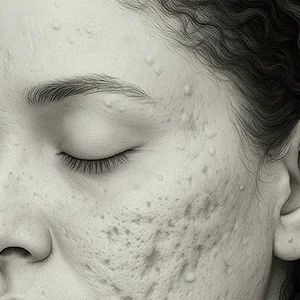No items found.

Indented, raised, or discolored marks left behind after active acne heals.
Acne scars form when deep inflammation damages collagen during the healing process. They may appear as pitted (atrophic), raised (hypertrophic), or discolored marks, leaving the skin surface uneven and irregular.
First-line care options include microneedling or RF microneedling to remodel collagen and soften depressions, TCA chemical peels or custom peels to resurface and even tone, and laser/light treatments such as IPL or Sciton Moxi to improve texture and discoloration. DiamondGlow and dermaplaning may be used to enhance skin smoothness as part of a comprehensive plan.
Adults with visible post-acne scarring, good general health, and realistic expectations seeking gradual, non-surgical skin improvement.



Click on an area to learn more about treatments that can enhance and rejuvenate it.
.webp)
Frontalis muscle and overlying skin spanning the upper face; repetitive movement creates horizontal lines and heaviness.
Text LinkChin projection and pad/mentalis complex affecting profile balance, dimpling, and the labiomental fold.
Text LinkMandibular border and soft tissue that define lower-face contour; influenced by bone, fat pads, skin quality, and masseter bulk.
Text LinkTemporal fossa/soft tissue that frames the lateral brow and forehead; hollowing can age the upper face.
Text LinkMalar fat pads and zygomatic arch region that provide midface contour; volume loss can flatten cheeks and deepen folds.
Text LinkLorem ipsum dolor sit amet, consectetur adipiscing elit. Suspendisse varius enim in eros elementum tristique. Duis cursus, mi quis viverra ornare, eros dolor interdum nulla, ut commodo diam libero vitae erat. Aenean faucibus nibh et justo cursus id rutrum lorem imperdiet. Nunc ut sem vitae risus tristique posuere.
See treatments
Frontalis muscle and overlying skin spanning the upper face; repetitive movement creates horizontal lines and heaviness.
Text LinkChin projection and pad/mentalis complex affecting profile balance, dimpling, and the labiomental fold.
Text LinkMandibular border and soft tissue that define lower-face contour; influenced by bone, fat pads, skin quality, and masseter bulk.
Text LinkTemporal fossa/soft tissue that frames the lateral brow and forehead; hollowing can age the upper face.
Text LinkMalar fat pads and zygomatic arch region that provide midface contour; volume loss can flatten cheeks and deepen folds.
Text LinkLorem ipsum dolor sit amet, consectetur adipiscing elit. Suspendisse varius enim in eros elementum tristique. Duis cursus, mi quis viverra ornare, eros dolor interdum nulla, ut commodo diam libero vitae erat. Aenean faucibus nibh et justo cursus id rutrum lorem imperdiet. Nunc ut sem vitae risus tristique posuere.
See treatments